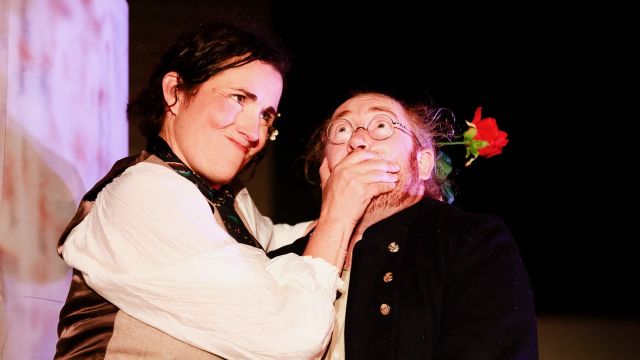Much Ado About Nothing
Much Ado is one of Shakespeare’s witty comedies where, once again, the Bard contemplated the vagaries of love, jealousy, greed and social class in a typically complex plot that twists its characters into dissembling, plotting, being hoodwinked and begging forgiveness. Put this in the hands of a clever director with a lively imagination and a small cast on an open-air stage and it’s amazing what can be achieved.
Samantha Young’s Much Ado is bright, fast, a little bit quirky – and thoroughly entertaining. Seven actors play fourteen roles in a production that has the audience involved (literally at several moments), amused – and even a little bit in awe of the quick character changes, the credibility of every character and the comedy that Young has infused into the production.
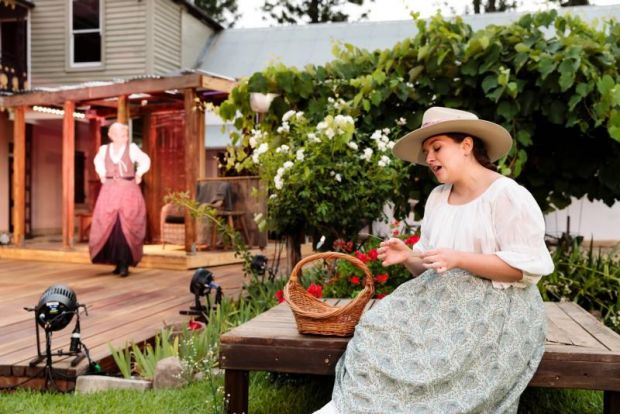
High on a grassy hillside, Bella Vista Farm lends itself to a rural vision, and Young sets the play in 19th century Australia. The set, designed by Damien Ryan, is the verandah of a split timber slab hut with a galvanised iron roof … and a tank stand. Nestled in the yard of the original two-storey farmhouse and surrounded with grapevines and roses, it is the perfect setting for a play that involves deception, eavesdropping and some fast character changes.
Shakespeare had varied ideas about love, usually expressed through more than one relationship in every play. In Much Ado there are the young, besotted lovers, Hero and Claudio – and the less enamoured Beatrice and Benedick, whose relationship is fraught based on a previous deception which Beatrice explains in the lines:
Indeed, my lord, he lent it me awhile, and I gave him use for it,
a double heart for his single one.
Marry, once before he won it of me with false dice.
This gives rise to the parrying between the two that Shakespeare used to comment on damaged love – and continues to give so many actors the opportunity to throw his witty, barbed, much quoted lines at each other.
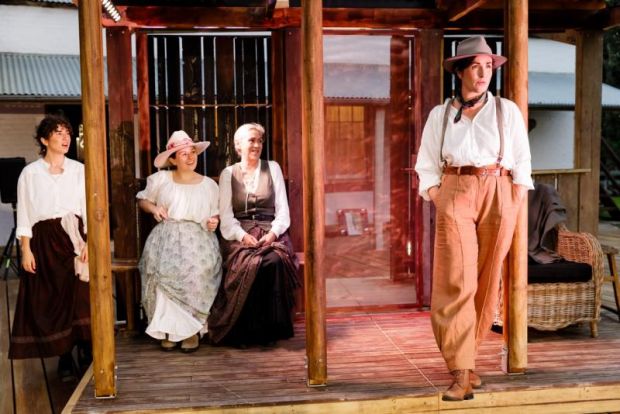
Megan O’Connell and Jay James-Moody do so brilliantly, finding the pace necessary for their battle of words yet losing none of Shakespeare’s ingenious choice of words and phrasing. O’Connell plays a Beatrice who is urbane, wise, self-possessed, respected – and protective of her cousin Hero.
Jay James-Moody plays a Benedick equally respected among his soldier friends. Sworn to bachelorhood, James-Moody makes Benedick charmingly affable – so that his witty, condescending parrying with Beatrice causes mirth from Claudio and Don Pedro. James- Moody is a consummate performer who brings a different jauntiness and dash to the role.
Both he and O’Connell have excellent comic timing, as do the other five performers.
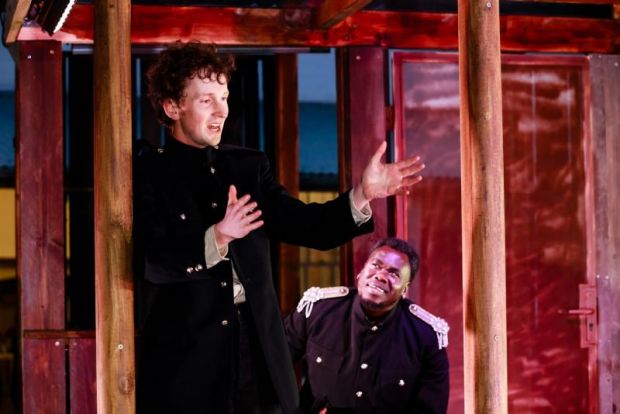
Leilani Loau plays a female Leonato, confidently in control of her domain and proud and caring of her daughter and niece. Loau uses the stage – and the audience – effectively, especially when doubling as the ‘Night Constable’ Dogberry, who moves among the audience, one of whom becomes a continuing reference in the final, funny scenes. Here, Loau uses hesitant timing that finds the humour and nuance in Shakespeare’s lines.
Ellen Coote plays both Hero - and Borachio, the wretch who schemes to make Claudio believe Hero has another lover. Coote moves easily from guileless and honest Hero to devious, money-hungry Borachio with apparent ease. Her Hero is light of foot and naively transparent – her Borachio is brash, loud and somewhat vulgar.
Toby Blome plays the naïve young soldier Claudio, as well as Conrade who is Borachio’s off-sider in crime, and Hero’s maid, Ursula. As Claudio, Blome shows the young, emotional soldier who falls in love easily – and is just as easily duped by Borachio and Don John. As Conrade he is a follower rather than a leader. As Ursula his is a tall, ungainly but endearing attendant.
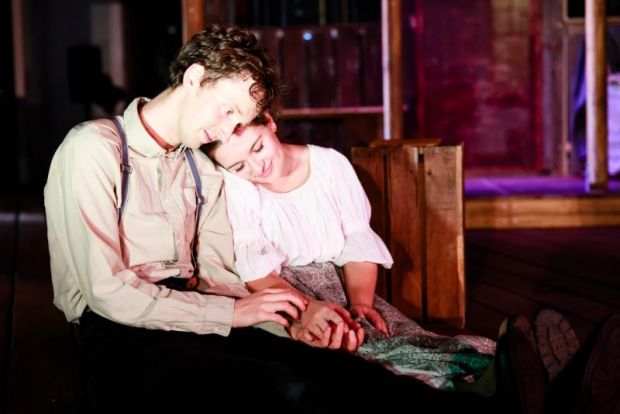
Don Pedro is played with effective status and command by Mandela Mathia, but it is as the Friar that Mathia endears himself to the audience, moving among them with blessings and good wishes as he makes his way on to the stage.
Don John on the other hand is devious and Ziggy Resnick makes him slippery and sly, almost sliding in and out of scenes – very different to Margaret, the other character played by Resnick. Here Resnick is cheerful, open, full of life.
Samantha Young has given her cast the opportunity to use their varied talents to play contrasting characters in one long, fast moving, demanding production. Even James-Moody plays a second role, the musician Balthazar, whom he makes a little self-effacing and naïve – once again a contrast to Benedick’s confidence.
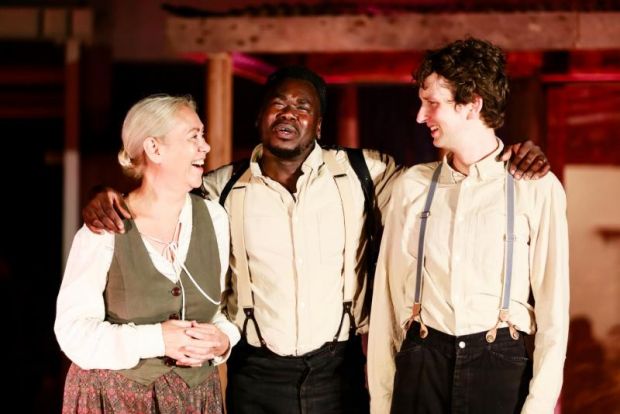
Young’s direction enhances the comedy in the play with moments of clever humour. Benedick hides in the grapevine and under the tank stand as he eavesdrops on the story of Beatrice’s love for him. Beatrice hides under a blanket on a cane chair then in high in the tank as she eavesdrops on the story about Benedick’s love for her. The funniest costume change occurs when Mathia is ‘caught’ having to change from priest to prince mid-scene.
There are subtle sight gags and intuitive blocking that keep the action moving without detracting from the plots or the characters or the ingenuity of the words. It is this sort of insightful, bold, contemporary direction and acting that makes Shakespeare’s comedies relevant for each new generation.
Carol Wimmer
Photographer: Karla Elbourne
Subscribe to our E-Newsletter, buy our latest print edition or find a Performing Arts book at Book Nook.

